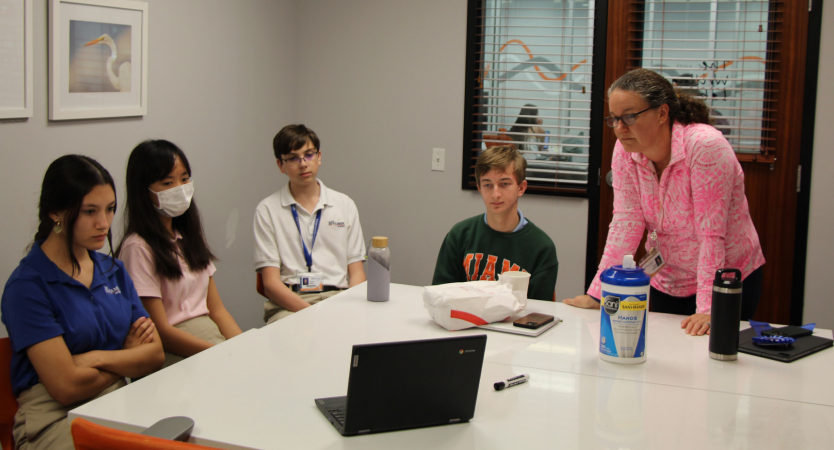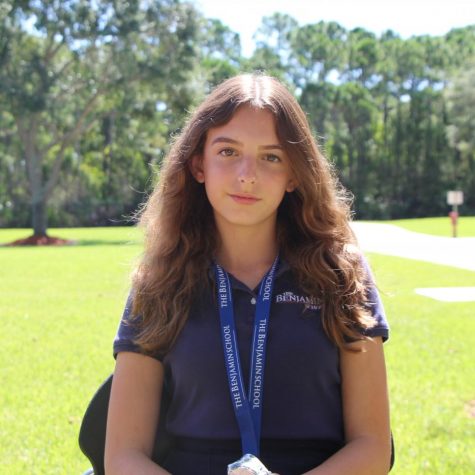Upper School Sending Three Teams to Local Brain Bee Competition
March 28, 2022
Four teams of students have been busy learning about synapses, cerabella, hormone production, and Phineas Gage in preparation to represent The Benjamin School at the fifteenth annual Brain Bee competition. Social studies teacher Mrs. Anne Franzen
is mentoring the three Upper School teams.
The first of the three teams is made up of freshmen Samantha Hill, Jia Guan, and sophomore Olivia Wells Funk. The second team is composed of senior Kat Scarborough and sophomores Atticus Fasnakis-Nosal and Keane Adam, and the final team’s roster is senior Jack Horgan, sophomore Matias Saiz, and junior Kiera Hodum.
After two years of competitions being held virtually due to COVID-19, the local stage of the Brain Bee will be held in person. The
competitors, teams of three students from grades 8 to 12, all study neuroscience facts leading up to the competition. This year’s global championship will be held in Paris, France.
The International Brain Bee competition was founded in 1998 by Dr. Norbert Myslinski. Dr. Myslinski’s interest in the human brain began at a young age, as multiple members of his family suffered from neurological issues. He dedicated his life to teach-
ing others about the brain in order to bring awareness to neurological and psychological disorders. The compe-
tition he founded has inspired many young adults to pursue medical careers.
Hill, eager to expand her knowledge in neuroscience, has found that Mrs. Franzen and science teacher Ms. Renee Szeliga have given her incredible advice.
“Max Planck provides for competitors a study guide on the anatomy, physiology, and diseases of the central and peripheral nervous systems, as well as specific neuroscience podcasts from Max Planck, and we are advised by a teacher, Mrs. Franzen, as
well as Ms. Szeliga, to watch certain neuroscience videos. There is also a website dedicated to quizzes on neuroscience. For the actual competition, there are three rounds, and after the first round, consisting of twenty questions, the best ten teams will progress to round two, with ten questions. The third round is sudden death, consisting of ‘Brain Buzz’ questions, during which the contestants are not allowed to converse with their team members about the answer. Spelling counts, since the answer to each question will be written down for the judges, who are neuroscientists at Max Planck,” said Hill.
Max Plank is an institute for neuroscience in Florida, located just down the road from The Benjamin School. Prior to the competition, competitors will receive a tour of the campus.
The competition requires extensive studying of all areas regarding neuroscience. Preparations for the Brain Bee are already underway, with students dedicating time every week to their neurological studies. The first portion of the competition is scheduled to occur at the Max Planck Institute of Neuroscience on April 2.
“Students spend every Thursday meeting and double checking that they are on the right track, but they’re spending a lot of time working on facts about the brain and neuroscience, memorizing them, trying to figure out how to problem solve at the bee. On the second of April we will go to Max Planck for a tour and the Brain Bee; that’s when the competition will occur,” said Franzen.
The materials Mrs. Franzen and Ms. Szeliga have provided are being put to good use. Students are using a variety of study methods and materials to prepare to compete, with the goal of expanding their knowledge on neuroscience to the fullest extent.
“I am currently working on completing all of the recommended reading and then I will begin listening to the podcasts. After I finish that, my group and I are planning on making a large study document and Quizlets of important concepts. This will make it
easier to memorize information,” said Hodum.
Wells Funk, Hill and Guan have been working together as a team to help each other prepare for the upcoming competition.
“My teammates and I have already started to prepare for the competition. We have gotten together and assigned sections of the required material to each person. For example, I will be our expert on ‘Diseases and Disorders’ and ‘Treating Brain Disorders.’ While each person needs to have a general understanding of all the content, this method definitely makes studying less overwhelming. We will also create quizlets, take notes, listen to podcasts, and watch videos about the brain,” said Wells Funk.
Apart from the amount of studying needed, students must also possess a passion for neurology that drives their study.
“I chose to participate in Brain Bee because I have always been fascinated by the uniqueness of the human brain, how it works, and the different health problems that arise from a brain malfunction,” said Saiz.
Despite the competition being an exciting event for all teenagers competing, there are still different aspects to the event, including what may be stressful or difficult for students. Guan shares what will be the biggest challenge for her, as well as the easiest task to overcome.
“The most challenging part of the competition process will be memorizing all the facts about the brain, and there will be ‘Brain Buzz’ questions, in which every member of a team has to provide an answer without talking to others. The easiest aspect of the competition process is that the study materials are very clear and straightforward, so we don’t need to find the study materials ourselves,” said Guan.
All nine Benjamin Upper School students that are scheduled to compete in the 2022 Brain Bee International neuroscience competition are praised for their dedication, passion, and hard work already put into studying neuroscience. For the competition to come, Benjamin students will surely perform to the best of their capabilities, exemplifying their drive to expand their knowledge about neuroscience in doing so.
.



